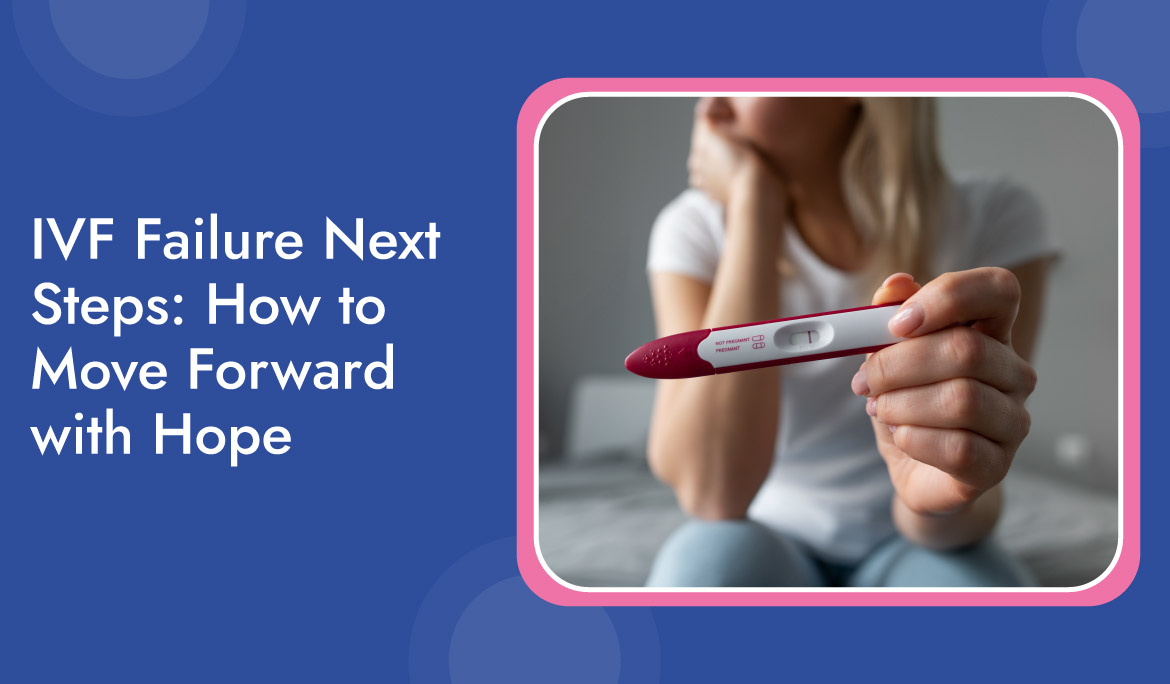In vitro fertilisation (IVF) is a blessing of advanced medical technology. It gives a ray of hope to those couples who struggle to conceive. But things get tough when the journey of IVF gets uncertain and ends in failure. The weight of dashed hopes, the sense of loss, and the feeling of isolation leave couples reeling, grappling with profound disappointment and a sense of hopelessness. While the pain and grief are undeniable, it is possible to navigate through the darkness and find renewed hope.
In this comprehensive blog post, we will explore the reason behind IVF failure, the emotional impact on individuals, and the IVF failure next steps. Keep reading!
Take control of your fertility journey. Consult our expert today!
A] Why Does IVF Fail?
1. Age-Related Factors
As the woman ages, the quality of eggs starts to decrease, leading to chromosomal abnormalities in embryos. Women aged over 35 are more likely to have IVF pregnancy difficulties than women below or up to 35. The older eggs are less receptive to ovarian response, causing IVF failure.
2. Embryo Quality
Though the embryos look healthier through a microscope, it doesn’t mean they will be receptive to the uterus. This particularly happens due to chromosomal abnormalities, causing deterioration in embryo quality and leading to IVF failure. However, embryo scope is an advanced technology that helps providers select quality embryos. It helps implant quality embryos into the uterus and get the best possible outcome.
3. Uterine or Endometrial Issues
Uterine or endometrial issues, like thin uterine lines, uterine fibroids, polyps, scar tissue, inflammation, or hormonal imbalances, are prime factors for IVF failure. These underlying issues make the uterine lining less receptive to support embryo implantation. Inadequate menstrual blood flow is another factor that causes thinner uterine lines, resulting in less receptive endometrium.
4. Sperm Quality
Low motility, abnormal morphology, and DNA fragmentation are the symptoms of poor sperm quality or male infertility. It indicates damage to the sperm’s genetic materials. If poor-quality sperm gets into the fertilisation process, it is more likely to hamper embryo quality. Further, it may become the reason why IVF doesn’t work.
5. Medical Conditions
Other medical conditions, such as genetic disorders, PCOS (Polycystic Ovarian Syndrome), lower AMH (Anti-Mullerian Hormone), and weak immune system may be the causes of the failed IVF cycle. That’s why it is necessary to get tested comprehensively before proceeding with in-vitro fertilisation (IVF). Doing so significantly eliminates the chances of getting IVF failure symptoms.
6. Lifestyle and External Factors
Poor lifestyle, such as smoking, drug use, excessive alcohol consumption, obesity, poor diet, and stress, can also be the reason behind IVF failure. Besides, the clinic’s reputation and proficiency in completing the fertilisation and implantation phases also affect the outcome. So, given the role of a quality clinic and doctor, ensure you get IVF done from a reputed clinic. The clinic must have treated countless patients with a high success rate. In such cases, you can find the best IVF doctor in Mumbai who has given thousands of couples a reason to smile and feel complete with an excellent success rate.
B] The Emotional Impact of IVF Failure
1. Understanding Grief and Loss
IVF brings hope into one’s life. If it gets broken, it brings a profound level of emotional distress. The joy, hope, and feeling of completeness suddenly change into grief and loss. Further, grief and loss encompass common feelings like sadness, anger, guilt, and frustration. These negative feelings may affect the couple’s relationship and bring further emotional complications. So, to cope with these emotional distresses, it is essential to know how to deal with them while not losing hope.
2. Coping with Emotional Triggers
If you have not succeeded, learning to cope with heightened emotions and supporting your partner is extremely important. It can be done through acknowledging and processing negative emotions and indulging in self-care activities. Seeking professional help can make this process a lot easier. If you have emotional triggers, like seeing pregnant women, social media feeds, and societal triggers, create an effective plan to deal with when these types of situations arise. In addition, taking breaks from social media or politely declining conversations about pregnancy can provide emotional relief.
3. The Importance of Emotional Validation
Acknowledging emotions rather than suppressing them helps in processing grief. Speaking openly with a trusted friend, therapist, or support group can validate feelings and foster emotional resilience. Recognising that IVF failure is not a personal failure can be an important step in healing.
C] How to Heal and Find Support
1. Building a Support Network
Family, friends, and support groups play a vital role in emotional recovery. Connecting with others who have experienced similar struggles can provide comfort. Seeking professional counselling or therapy tailored to fertility challenges can offer deeper emotional relief and coping strategies.
2. Practicing Self-Care
Engaging in activities, such as mindfulness, journaling, or exercise can help reduce stress and promote well-being. Taking time for hobbies, relaxation, and self-reflection can improve emotional stability and foster a sense of control during this difficult time.
3. Navigating Your Relationship
IVF failure can put a strain on a relationship, that’s why open communication is essential. Couples should express their emotions honestly and support each other through shared grief and renewed hope. Creating a safe space to discuss plans without pressure can help both partners navigate their journey together.
D] Next Steps After IVF Failure
1. Understanding the Failure
Meeting with your doctor to review the cycle can provide clarity. Exploring additional testing, such as genetic or uterine evaluations, can help uncover potential underlying issues and guide future decisions.
2. Exploring Future Options
Adjustments to future IVF cycles, such as considering donor eggs or embryos, may improve the chances of success. Other alternatives, like surrogacy or adoption, might also be viable paths to parenthood. Exploring these IVF failure treatment options with medical professionals can help in making an informed choice.
3. Knowing When to Pause
Taking a break to prioritise mental and physical health before proceeding with another cycle can be beneficial. Stepping back from the process can provide time for healing and a fresh perspective on the next steps.
4. Considering a Second Opinion
Seeking advice from another fertility specialist or clinic may offer new insights and alternative approaches. A different perspective can provide reassurance, and they may suggest better treatment options.
Conclusion
The journey through IVF failure is emotionally tiring, but healing and hope are possible. Acknowledging grief, seeking support, and taking practical steps toward future options can help couples navigate this challenging experience. Whether choosing to try again, explore alternatives, or take a break, every decision should be based on a positive perspective and hope. Because hope and positive perspective are guiding lights that inspire us to keep moving even in adverse situations.
Dr Hrishikesh D. Pai is a highly expert and renowned IVF doctor, sought after for cost-effective IVF treatment in Mumbai. He takes every preventive measure to ensure your dream of becoming a parent never gets dashed. Contact us today and make your parenthood dream come true with us.
Take control of your fertility journey. Consult our expert today!

Dr. Hrishikesh Pai
Dr. Hrishikesh Pai is one of India's leading fertility specialists, with over 40 years of expertise in reproductive medicine and the Founder of Bloom IVF Group. He plays an important role in advancements in fertility care, establishing 11 world-class IVF centres across the country. Dr. Pai received numerous awards and is an Honorary Professor at D.Y. Patil University, Navi Mumbai. He is well known for his compassionate approach and continues transforming lives by fulfilling people's dreams of becoming parents.













